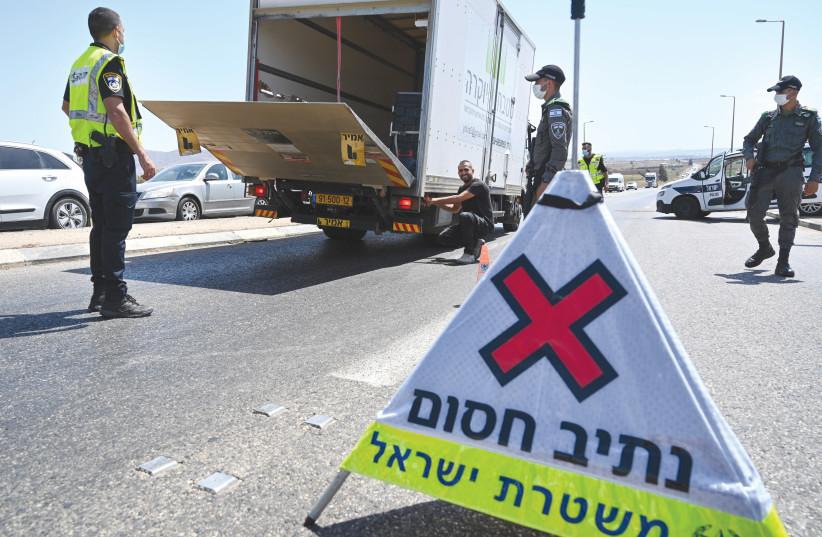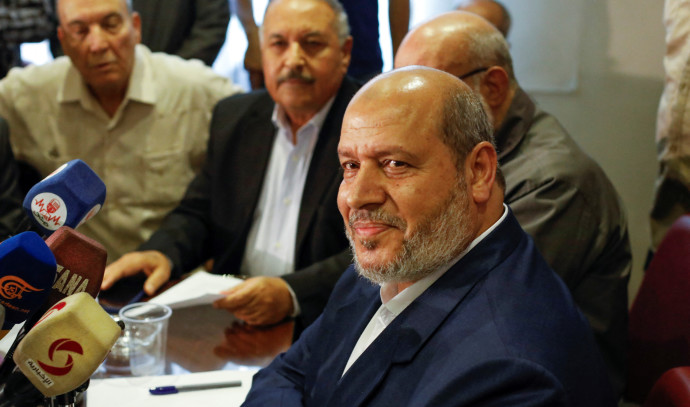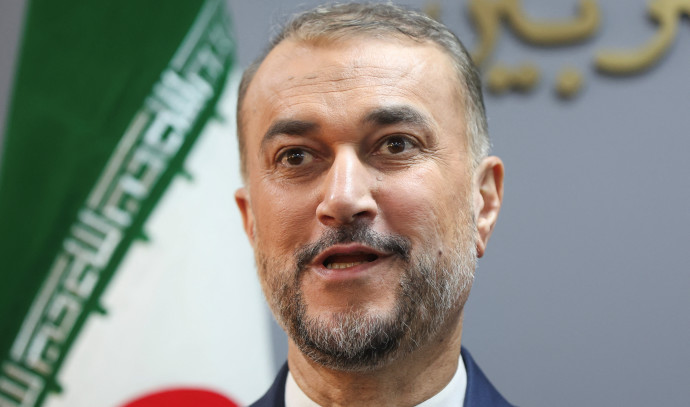world news
Gilboa Prison break follows the pattern of Yom Kippur War

The Second Lebanon War, with many variations, followed a similar pattern. An ill-prepared entrance into the war, followed by self-flagellation at the way the country performed during the war and a feeling among many that it was a disaster that showed Israel had lost its edge, followed by the Winograd Commission of Inquiry, but also followed later by a realization that the war did not go as bad as everyone thought at the time, since it brought more than 15 years of quiet to the North.
And now into this pattern, though at a much, much smaller scale, can be fit the brazen escape of six hardened terrorists from the Gilboa Prison.
POLICE OFFICERS and prison guards stand outside the Gilboa jail following the escape by Palestinian security prisoners. (credit: FLASH 90)
Basic incompetence facilitated the breakout: The maximum-security prison was built with “structural flaws,” including a hollow space underneath which allowed the prisoners to reach the facility’s outer wall. Building materials used in the construction of the prison were left under the floor of the cell and were apparently used in the escape. The prison’s structural plans were put on the Internet.
One prison guard reportedly fell asleep, and another – rather than following security cameras in the prison’s control room – was apparently watching television. Devices to disrupt cellular phone use were not used. The six escapees were housed in the same cell, even though three of them were tagged earlier as likely candidates for an escape. No one caught wind of the tunneling going on inside the prison walls.
When the prison break was revealed, the nation was in shock. The fact that the six inmates were able, with only rudimentary tools, to flee from a maximum-security prison was seen as a humiliation. According to this telling, the escapees revealed that the emperor had no clothes, that Israel was a paper tiger.
The Palestinians celebrated this “victory,” which they claimed showed that the Zionist entity could be brought low by resourcefulness and determination.
While the dragnet was under way searching for the men, concern mounted that this could be the long-feared spark to an oft-predicted third intifada; that Palestinian security prisoners around the country would rise up and riot in solidarity; that the West Bank would explode and that rockets would once again rain down on Gush Dan from Gaza.
Less than two weeks later it was over. The last of the six escapees were captured, the last two last Saturday night in Jenin. None of those dire, doomsday predictions fully came to fruition.
While the escape exposed serious flaws in the Prisons Service, the recapture of the six men demonstrated the breadth of Israel’s intelligence capabilities. Four of the six were captured inside Israel, the last two in Jenin. Concerns that they had succeeded in fleeing to Jordan were unsubstantiated.
That the men were recaptured without any loss of life, either theirs or IDF soldiers or policemen, was also a testament to the success of the operation and the efficacy of the security establishment.
This could have had a much different ending: with the escapees killed in a firefight that also killed other Palestinians and IDF soldiers. That it all ended with a whimper, rather than a bang, was important in containing the situation.
Clumsiness led to the escape, but Israel’s ability to react fast on its feet led to the surprisingly good climax: as was the case with the Yom Kippur War, and with the Second Lebanon War.
And now the saga moves on to the next stage: learning the lessons. Even before the last of the escapees had been returned to jail, Prime Minister Naftali Bennett announced that a commission of inquiry would be established to thoroughly investigate the matter. A head of the commission was already announced: former military advocate-general Menachem Finkelstein.
Bennett vowed that the investigation would be “comprehensive and serious.”
“We are looking at things through a broader lens, and view what happened as a wake-up call. Some of the state’s systems have atrophied in recent years and need to be improved, changed and strive for excellence.
“It’s possible and necessary to work differently, particularly in a security organization such as the Israel Prisons Service,” he said at a weekly cabinet meeting, stating what had become quite obvious. “Quality appointments that are based strictly on professional parameters, defining national objectives, and formulating organized work plans. What’s been broken can be fixed.”
This, too, felt distinctly Israeli. Disasters, tragedies and mishaps in this country frequently spawn various commissions of inquiry. At their best – state commissions of inquiry – they act as important correctives, not only holding people responsible or appropriating blame, but also looking at the faulty way of doing things that led to the situation in the first place.
At their worst – inquiry committees like the ones the haredi parties were interested in establishing to look into the Lag Ba’omer Meron tragedy – they are heavily politicized bodies prone to whitewashing events.
The professional commissions – rather than the political ones – are critical for a country like Israel, beset with abundant challenges. Needing to deal with enormous problems coming from all different directions at one time, the country will invariably trip up and falter from time to time. There is no sin in that, as long as the lessons are learned, and are implemented.
And therein lies the rub. The annual State Comptroller’s Report exposes various problems in the state’s institutions on a regular basis, but the recommendations are too frequently ignored.
Israel’s current ambassador to the United Nations, Gilad Erdan, set up a committee three years ago when he was the public security minister to look at flaws in the way Israel was dealing with the Palestinian security prisoners.
The committee met and issued its recommendations. These recommendations included harsher conditions for the security prisoners, reducing their autonomy, doing away with their ability to cook for themselves and to be housed according to their political affiliation: Fatah members with Fatah members, Hamas with Hamas.
Had those recommendations been implemented, this month’s prison break might not have happened. But those recommendations were not implemented.
THE FINKELSTEIN COMMISSION has its work cut out for it. It will need to investigate not only the operational errors at the Gilboa Prison that led to the prison break, but also systemic organizational flaws that made those operational errors possible: budgetary problems, a politicized appointments process, less than stellar personnel, and a culture of whitewashing problems.
In addition, the commission should look at the country’s security philosophy that sanctifies quiet.
One of the reasons that the prisoners were housed together, that their cellular phones were not jammed or taken away, and that they had the freedom to be able to spend hours upon hours burrowing their way out of the facility, was that the authorities did not want to impose harsher conditions on the inmates, for fear it would lead to unrest.
Calm and quiet are good and important, but they often come at a price. The price this time was a prison break that gave Israel a humiliating black eye, but which could have been much worse.
Now the country has to figure out how to make sure that the “much worse” will never happen. If history is any indication, the country will be able to do just that. Israel has a knack for learning from its mistakes. What it needs to work on, however, is how not to make those mistakes in the first place.
world news
Dissolving Hamas’ military, forming sovereign Palestinian state would bring ‘change’ – expert

Hamas, through a senior official, stated its readiness to enter a cease-fire of five years or more with Israel and transition into a political entity if an independent Palestinian state is established along pre-1967 borders. The official, Khalil al-Hayya, considered Sinwar’s right hand, expressed these views during a recent interview amidst stalled cease-fire negotiations.
Dr. Ghassan Khatib, a lecturer at Birzeit’s University and former minister of labor for the Palestinian Authority, provided his perspective to The Media Line. “It’s worth waiting to see if this statement reflects a significant shift,” he noted, highlighting a common inconsistency between individual remarks by Hamas leaders and the group’s official stance.
Dr. Khatib further explained the internal dynamics within Hamas: “The statement can also reflect dissent and the debate within Hamas. Different leaders have different views, but it could also be a tactic, considering the imminent threat of the Israeli army to enter Rafah.”
He added that while the promise to dissolve the military wing and pursue a sovereign state was notable, “Hamas being willing to put its guns down isn’t something you hear every day. Dissolving the military wing of Hamas and falling in line with a Sovereign Palestinian State on the 1967 borders would bring a powerful change.”
“Whatever the reasons they make this statement now, it’s important to dialogue with Hamas because they are a very relevant part of Palestinian internal politics. Whether the Israelis like it or not, that’s the fact. Even if the statement made by Al-Hayya has conditions unlikely to be accepted by Israel, it is important to continue the dialogue, and this is also true for America and other Western countries,” he concluded.
Natural skepticism
While Dr. Khatib emphasizes the importance of dialogue with Hamas despite skepticism about their intentions, some suggest a more cautious perspective, questioning the sincerity of Hamas’ statements and suggesting that their motives may be influenced by the immediate threat of Israeli military action.
Chuck Freilich, former deputy national security adviser and senior fellow in INSS, told The Media Line, “Hamas is aware of its imminent demise if the IDF enters Rafah. Making remarkable statements, such as the one made by Al-Hayya, gives them more time and feeds into the narrative believed by their supporters worldwide. Still, Israeli leaders should pursue this dialogue in the future if we have a different government.”
“If this statement made by Al-Hayya is serious, then they should be open to dialogue after the Israeli conducts its plans to go into Rafah. It’s doubtful that Israel would entertain such dialogue, as it remains committed to dismantling Hamas. After Hamas is removed from Rafah, then the Palestinians should announce an initiative with their top leaders or with a formal declaration,” concluded Chuck Freilich.
While Hamas has previously maintained a hardline stance against Israel, this shift towards a potential two-state solution represents a notable concession. However, it remains unclear if this signifies a permanent resolution to the conflict or merely an interim step toward Hamas’ longstanding goal of Israel’s destruction.
Israel nor the Palestinian Authority have yet to comment.
world news
Iranian FM: Israeli weapons are ‘toys for our children to play with’

Iranian Foreign Minister Hossein Amir-Abdollahian joked a day after Israel’s strikes in Iran that the weapons used were “more like toys that our children play with – not drones,” according to a Saturday article from Iran’s semi-official Mehr News Agency.
Making the comments in an interview with NBC News, Abdollahian said “As long as there is no new adventurism by Israel against our interests, then we are not going to have any new reactions.”
Threats against Israel
“If Israel takes a decisive action against my country and this is proven to us,” he said, “our response will be immediate and to the maximum and will cause them to regret it.”
The foreign minister went on to threaten that his comments were only a warning, and that “We could have hit Haifa and Tel Aviv… We could have also targeted all the economic ports of Israel.”
Abdollahian said that the only reason that Iran had not successfully hit Haifa, Tel Aviv or any major port was because Iran’s “red lines [were] civilians…We only had a military purpose.”
A 7-year-old Arab girl was killed during Iran’s mass drone attack which saw hundreds of UAVs and multiple ballistic missiles fired seemingly randomly at Israel. While few Iranian aerial assault weapons successfully hit Israel, one hit a northern Arab village and one hit Arad- which is where the 7-year-old girl was killed.
world news
White House urges Congress to quickly send foreign aid bill to Biden’s desk

Passing the national security supplemental bills would send a powerful message about the strength of American leadership at a pivotal moment, the White House Office of Management and Budget said in a statement released Friday morning as the House continues debates on rules for proceeding with the bills.
The supplemental funding package provides long overdue funding to support Ukraine as it continues defending itself against Russia’s brutal war of aggression. Ukraine must prevail, the White House said.
This supplemental funding also helps Israel protect its people against Hamas and Iran and its other proxies, including Hezbollah.
The White House’s statement
“It is critical that we quickly help Israel replenish its air defenses following Iran’s recent brazen and unprecedented attack and ensure Israel maintains its military edge against Iran or any other adversary,” according to the statement.
The funding would also provide urgent life-saving humanitarian assistance for Palestinian civilians in Gaza and vulnerable people suffering around the world, the statement said, as well as critical support to Indo-Pacific partners.
“The world is watching what the Congress does,” the White House said. “The Administration urges both chambers of the Congress to quickly send this supplemental funding package to the President’s desk.”
-

 Camera3 years ago
Camera3 years agoCharles ‘Chuck’ Geschke, co-founder of Adobe and inventor of the PDF, dies at 81
-

 TOP SCEINCE2 weeks ago
TOP SCEINCE2 weeks agoInherited predisposition for higher muscle strength may protect against common morbidities
-

 TOP SCEINCE2 weeks ago
TOP SCEINCE2 weeks agoStellar winds of three sun-like stars detected for the first time
-

 TOP SCEINCE2 weeks ago
TOP SCEINCE2 weeks agoBrightest gamma-ray burst of all time came from the collapse of a massive star
-
world news2 weeks ago
Jewish diaspora expresses concern as Iranian drones launch toward Israel
-

 Camera3 years ago
Camera3 years agoSony a7 IV sample gallery
-
world news5 months ago
Gulf, France aid Gaza, Russia evacuates citizens
-

 TOP SCEINCE1 week ago
TOP SCEINCE1 week agoPlastic pollution can kill variety of ocean embryos

